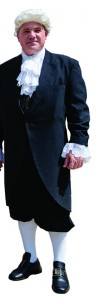by Allison Gorman

John Vile seems an unlikely James Madison impersonator. With his infectious laugh and outsized personality, it’s hard to believe he regularly channels the bookish, introverted man Washington Irving once described as “a withered little apple-John.” It’s also hard to believe that there is a market for James Madison impersonators. But for the past several years, Vile has enjoyed steady work donning tights and a wig and addressing academic groups as America’s fourth president.
Granted, he hasn’t quit his day job. In fact, as dean of the Honors College since 2008 (and chair of the Department of Political Science before that), Dr. John Vile puts in a notoriously long day. He shows up early, stays late, and takes work home with him at night. And somehow, in the midst of “deaning,” as he puts it, he writes—copiously. He’s built an international reputation as a constitutional scholar; he’s written and edited more than two dozen books on the subject (including a thousand-page, two-volume encyclopedia).
Some books have taken him five years to complete, but his latest, The Writing and Ratification of the U.S. Constitution: Practical Virtue in Action, was finished in just a few months. (He happened to be working on two other books at the same time.)
“I just can’t keep from writing because I love it so much,” Vile says. “It’s an extension of my teaching. I grew up in a big family with lots of noise, and I can work around other things. So a lot of times, I’m working on a book here, but I’m building it around meetings and interviews.”
In that respect, Vile is very much like the president he portrays—an agile, prolific writer and a famously hard worker.
Vile reminds audiences that Madison not only drafted George Washington’s first address to the U.S. House of Representatives but also wrote the House’s official response to Washington . . . and Washington’s response to the House. And his legacy as “the father of the Constitution” is largely the result of his diligence: unlike the other 54 delegates to the Constitutional Convention, he showed up early, ideas in hand. What evolved into the U.S. Constitution began with his working document, the Virginia Plan.
“Madison was very influential because he worked as hard as anybody there,” Vile says.
Vile’s latest book is, in large part, a narrative account of that 1787 event, which was intended to strengthen and refine the role of the federal government. Vile calls the Constitutional Convention “a pivot point not just in the history of America but in the history of the world,” when 55 men, each with his own world view and parochial prejudices, hammered out a document that would stand a fighting chance of ratification by a loose confederation of states. “You just don’t get that many examples of people deliberating together in a reasoned fashion and coming up with a product that everybody recognized was flawed but that most recognized was a significant improvement over what they had—and it [has] lasted 225 years,” he says.
True to form, Vile worked hard to ensure that his book would be published by the convention’s 225th anniversary in September. But the book is timely for other reasons, too. It offers a model of something Americans say they want: political pragmatism and cooperation. It also explains the practical underpinnings of a document that has become both romanticized and polarizing. Once, the Constitution was just another high school reading assignment; suddenly, in light of controversial legislation and Supreme Court decisions, it has new life outside the classroom as everyday Americans parse its words.

Vile rejects Thomas Jefferson’s sweeping characterization of the framers of the Constitution as “an assembly of demigods”—some, like Madison, were brilliant, while others decidedly were not—and he warns against idealizing the Constitution outside its historical context.
“I don’t see the Constitution so much as the product of grand political theory—although it did embody some of that too—but of practical solutions to issues that most of the delegates recognized,” he says. “I don’t think we should idolize the Founders, but I also don’t think it’s fair to dismiss their work because they didn’t recognize all the rights we recognize today. Had the convention been convened to eliminate slavery, give women the right to vote, or create a system of perfect democracy, it would obviously be regarded as a failure, but this was not its main purpose, and that purpose was settled in a wise fashion.”
Vile says that Americans who argue over the Constitution (or gripe about politicians who do the same) might be surprised by the degree to which conflict is built into the document—thanks in great part to Madison’s design. “We’re always complaining about the lack of consensus and conflict,” Vile says, “but Madison might have been much more pleased with that than we might think. He might say, ‘Yes, what you find so worrisome is, in fact, what helps preserve your liberties.’”
So while Madison has never captured the popular imagination as, say, Washington and Jefferson have, he’s made a big comeback in academia. “There have probably been more biographies of Madison in the last five years than there have been of any Founding Father,” says Vile. “Not to classify myself as an intellectual, but he tends to appeal to those of us who dwell more on ideas than on personalities.”
For now, Vile will continue to bring those ideas to life on stage—although he still hasn’t found a decent wig. During one speech under particularly hot lights, he says, “I started out looking like Madison, and I ended up looking like Einstein.” And then there is the challenge of portraying a cerebral man whose message defies sound bites. (Historians agree that Madison would now be considered unelectable.) After one extemporaneous, 45-minute presentation, Vile says, the next day’s write-up included just one (off-message) quote: “These tights are really tight.”
“I said it,” he admits, laughing. “I just didn’t expect to be quoted.”
For Dr. John Vile, just another occupational hazard—and all in a day’s work.

COMMENTS ARE OFF THIS POST